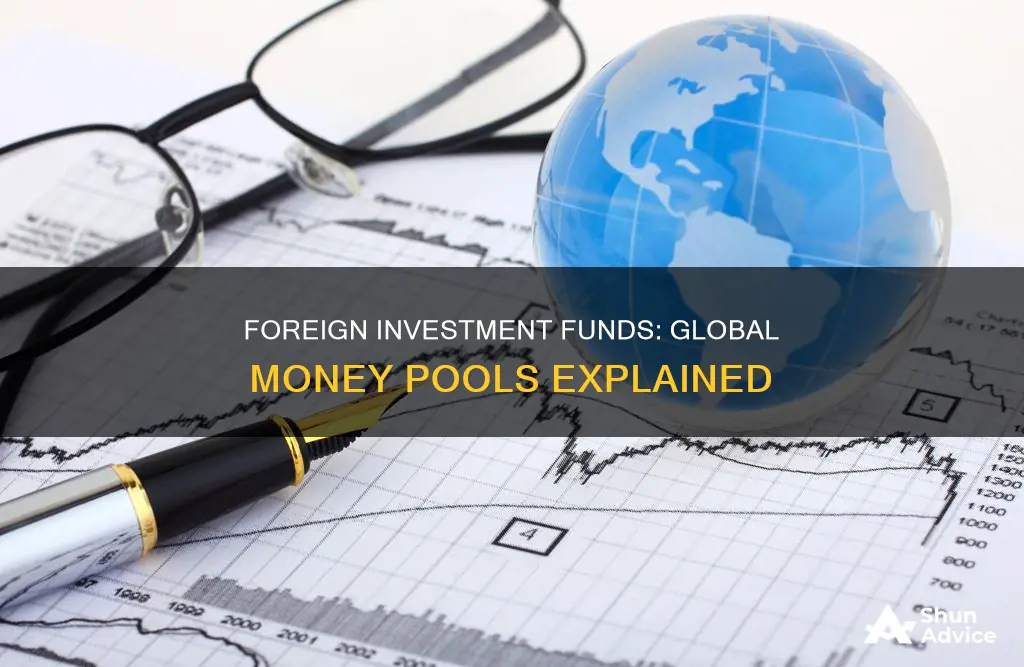
Foreign investment funds (FIFs) are investment funds established and regulated in a jurisdiction outside of the investor's home country. They are typically set up to invest in a variety of financial instruments, such as stocks, bonds, and other securities. FIFs can be structured as mutual funds, exchange-traded funds (ETFs), closed-end funds, hedge funds, private equity funds, real estate investment trusts (REITs), or venture capital funds. These funds provide investors with access to international markets and can help diversify their portfolios. However, investing in FIFs also comes with risks, such as currency volatility and changing economic or political environments.
| Characteristics | Values |
|---|---|
| Type of Fund | Investment fund established and regulated in a jurisdiction outside of the investor's country of residence |
| Investment Type | Stocks, bonds, and other securities |
| Structure | Mutual funds, exchange-traded funds (ETFs), closed-end funds, hedge funds, private equity funds, real estate investment trusts (REITs), venture capital funds |
| Tax Rules | May be subject to different tax rules than domestic investment funds |
| Taxpayer Requirements | May have to pay tax on any income or gains received from the fund, even if not received by the taxpayer |
| Tax Rules Variability | Depends on the country in which the fund is established and the nature of the investments held by the fund |
What You'll Learn

Foreign Direct Investment (FDI)
FDI investors typically take controlling positions in domestic firms or joint ventures and are actively involved in their management. The investment may involve acquiring a source of materials, expanding a company’s footprint, or developing a multinational presence.
FDI can be made in a variety of ways, including opening a subsidiary or associate company in a foreign country, acquiring a controlling interest in an existing foreign company, or through a merger or joint venture with a foreign company. The threshold for an FDI that establishes a controlling interest is a minimum of 10% ownership stake in a foreign-based company.
There are three types of FDI: horizontal, vertical, and conglomerate. With horizontal FDI, a company establishes the same type of business operation in a foreign country as it operates in its home country. Vertical FDI involves a business acquiring a complementary business in another country. Conglomerate FDI occurs when a company invests in a foreign business unrelated to its core business, often taking the form of a joint venture.
FDI is distinct from foreign portfolio investment, which involves the addition of international assets to a company's portfolio and is a form of portfolio diversification. FDI, on the other hand, requires a substantial and direct investment in, or outright acquisition of, a company based in another country.
ICICI Bank Debt Funds: A Comprehensive Investment Guide
You may want to see also

Foreign Portfolio Investment (FPI)
Foreign investment funds, or international funds, are funds that invest in companies based in countries outside of the investor's home country. They are generally riskier than domestic funds due to exposure to different currencies, economies, and geopolitical issues. However, they can also bring higher returns and help investors diversify their portfolios.
FPI is often carried out through securities exchanges or over-the-counter market transactions. It provides investors with access to international markets and the potential for higher returns. FPI can also increase liquidity in domestic capital markets and promote the development of equity markets.
However, FPI comes with certain risks. Investors are exposed to volatile asset pricing and jurisdictional risks when investing in foreign markets. Currency fluctuations, political instability, regulatory changes, and economic volatility can all impact the value of FPI holdings.
In summary, Foreign Portfolio Investment (FPI) is a crucial aspect of global diversification, providing investors with access to international markets and the potential for higher returns. While it offers benefits such as portfolio diversification and increased liquidity, investors must also carefully manage the associated risks.
Best Funds to Invest in NPS: Where to Start?
You may want to see also

Passive Foreign Investment Company (PFIC)
A passive foreign investment company (PFIC) is a corporation based outside of the US that meets one of two conditions:
- Income Test: At least 75% of the company's gross income is passive income, i.e., derived from investments or other sources unrelated to regular business operations.
- Asset Test: At least 50% of the company's assets are held for generating passive income in the form of interest, dividends, or capital gains.
PFICs are subject to strict and complicated tax guidelines by the Internal Revenue Service (IRS). US investors who own shares of a PFIC must file IRS Form 8621 and report actual distributions, gains, income, and increases in QEF elections. This form is lengthy and complicated, and investors are generally advised to seek professional tax help.
PFICs were first recognised through tax reforms passed in 1986 to close a tax loophole that allowed US taxpayers to shelter their offshore investments from taxation. Investments designated as PFICs are taxed as ordinary income and are subject to high tax rates. Examples of PFICs include foreign-based mutual funds and startups.
US investors who wish to diversify globally can avoid PFIC status by investing in domestic mutual funds and ETFs that hold foreign assets.
Mutual Funds: High Market, High Risk?
You may want to see also

Foreign Investment Funds (FIFs)
FIFs are typically set up to invest in a variety of financial instruments, such as stocks, bonds, and other securities. They can be structured as mutual funds, exchange-traded funds (ETFs), closed-end funds, hedge funds, private equity funds, real estate investment trusts (REITs), or venture capital funds.
Investing in a FIF can provide access to international markets and help diversify an investor's portfolio. However, it also comes with higher risks due to exposure to currencies, changing economies, and geopolitical issues. For example, currency volatility can affect the real returns of an investor's portfolio. Additionally, changing economies and international regulations require consistent due diligence to stay on top of changing economic trends and legislative changes.
Before investing in a FIF, it is essential to understand the tax implications, as they may differ from those of domestic investment funds. For instance, in the UK, taxpayers who hold shares in a FIF may need to pay tax on any income or gains received from the fund, even if they don't actually receive the income or gain. The specific tax rules for FIFs can vary depending on the country in which the fund is established and the nature of the investments held.
A Guide to Investing in HDFC Liquid Funds
You may want to see also

Mutual Funds
A foreign fund is a type of fund that invests in companies based outside the investor's country of residence. Foreign funds can be mutual funds, closed-end funds, or exchange-traded funds. Mutual funds are a type of investment vehicle that pools money from multiple investors to purchase a diversified portfolio of stocks, bonds, or other securities. They are managed by professional money managers and provide investors with access to a wide range of assets.
There are several benefits to investing in mutual funds. Firstly, they offer professional management, as fund managers research and select securities, as well as monitor their performance. Mutual funds also provide diversification by typically investing in a range of companies and industries, reducing the risk of losing money if a single company fails. They are also affordable, with most mutual funds setting a relatively low dollar amount for initial investment and subsequent purchases. Additionally, mutual funds offer liquidity, allowing investors to redeem their shares at any time for the current net asset value (NAV) plus any redemption fees.
There are various types of mutual funds, including money market funds, bond funds, stock funds, and target date funds. Money market funds have relatively low risks as they can only invest in certain high-quality, short-term investments. Bond funds aim for higher returns and carry more risk. Stock funds can be further categorised into growth funds, income funds, index funds, and sector funds. Growth funds focus on stocks with potential for financial gains, while income funds invest in stocks that pay regular dividends. Index funds track a market index, and sector funds specialise in a particular industry segment. Target date funds hold a mix of stocks, bonds, and other investments, gradually shifting the mix over time according to the fund's strategy.
In summary, mutual funds are a popular investment choice as they offer professional management, diversification, affordability, and liquidity. They provide investors with access to a wide range of assets and can be an effective way to build a diversified investment portfolio.
Hedge Funds: Regulated Investment Companies?
You may want to see also
Frequently asked questions
A foreign investment fund (FIF) is a type of fund that invests in companies based outside of the country in which the investor lives. They can be set up to invest in a variety of financial instruments, such as stocks, bonds, and other securities.
There are several types of foreign investment funds, including mutual funds, exchange-traded funds (ETFs), closed-end funds, hedge funds, private equity funds, real estate investment trusts (REITs), and venture capital funds.
A foreign investment fund invests in companies based outside of the investor's home country, whereas a global fund includes companies based both inside and outside of the investor's home country.







